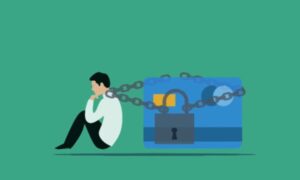More and more people need to take out a loan in order to be able to cope with the financial requirements of everyday life. But also a house construction or the purchase of a car ensure that one must take out a loan to be able to obtain the necessary financial resources. But what is a personal loan and how does it work?
What is a personal loan?
In the financial world, a personal loan is a loan that is secured by the borrower’s income or a guarantee. This is different from a concrete loan, which is secured by a tangible asset, such as real estate. In a personal loan, banks lend their money to individuals who can assure with a fixed income that they will be able to repay the desired sum to the credit institutions within the set period. Since as early as the 1930s, banks have been granting personal loans to Fpersons who are unable to obtain payment in kind.
The history behind the personal loan
The personal loan gradually replaced the real loan, which was granted to people who could use real estate or other tangible assets to ensure that a loan could be repaid to the banks. A loan made on the basis of personal liability did not appear until the mid-1920s. Today, banks usually speak of personal loans, while a real loan is more commonly referred to as a mortgage.
By definition, the various banking institutions in the first half of the 20th century still disagreed on the rules governing personal credit. It almost seemed as if each lender had its own rules for making the loan. Until 1998, the personal loan was called a “loan of money without real security”.
What is the purpose of a personal loan?
Smaller loans can be used, for example, for the purchase of a car, or be a quick help when a major purchase is pending in the household. But the personal loan can also help for the construction of a family house. Quick personal loans online (with no credit check) are offered by most banks, but also on the Internet by some credit institutions.
How do you get a personal loan today?
Today almost no employee can do without a loan. You have to buy a new car, but you don’t have the financial means on hand at the moment, no problem, the bank is happy to help you out. Or, however, the washing machine suddenly broke down, even in such a case, most employees have to take out a short-term loan to be able to carry out everyday life properly again. A personal loan belongs today to the daily business of banks and financial institutions. Even on the Internet, you can usually quickly and easily take a loan to fulfill one or the other desire or to quickly obtain help in an emergency situation.
In order to receive a loan, borrowers must prove their creditworthiness to the respective credit institutions today. This is usually done by submitting current proof of income. Anyone applying for a personal loan will be asked about their assets and income, which will then be used to calculate the loan.
If the applicant is creditworthy, i.e. the banking institution is of the opinion that the desired loan including interest can be repaid on time, the desire for a loan can be implemented. For this purpose, the contract is drawn up, which, in addition to the desired loan amount, also contains the interest imposed by the credit institution for the payment of the loan. Likewise, the contract contains the term in which the sum including interest must be repaid.
However, before the contract can be concluded, the borrower must usually submit a Schufa report. This contains information about existing debts, but also shows information about bank accounts, current contracts or even concluded credit agreements.
In the case of a personal loan, the borrower’s income is usually what counts. The banking institution checks the regular income and then decides whether this is sufficient to be able to pay off the loan on time. In this case, the borrower does not have to name additional guarantors or be able to present tangible assets as collateral. However, if the personal loan is used to finance a construction project, the bank may additionally require the tangible value of the property as collateral in order to obtain full security.
Creditworthiness is crucial
To be eligible for a personal loan, an applicant must have a good credit rating. This can be ensured, for example, by a regular, high salary or by financial investments. A negative score in Schufa, on the other hand, can prevent a loan from being granted.
Of course, it is important to the lenders that they are repaid the amount agreed in the loan on time and in full by the applicant. If the applicant cannot guarantee this on his own, it is also possible to include a guarantor in the contract, who will assume all costs incurred by the applicant and thus provide security for the credit institution.



































